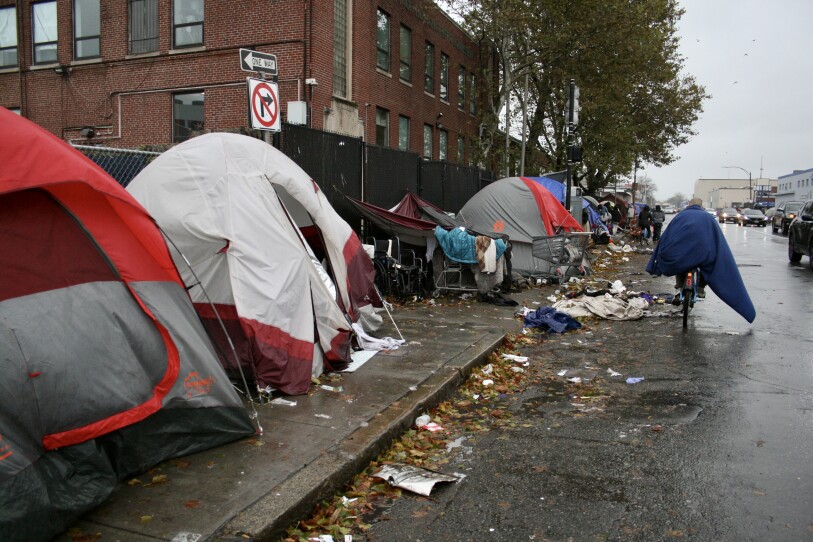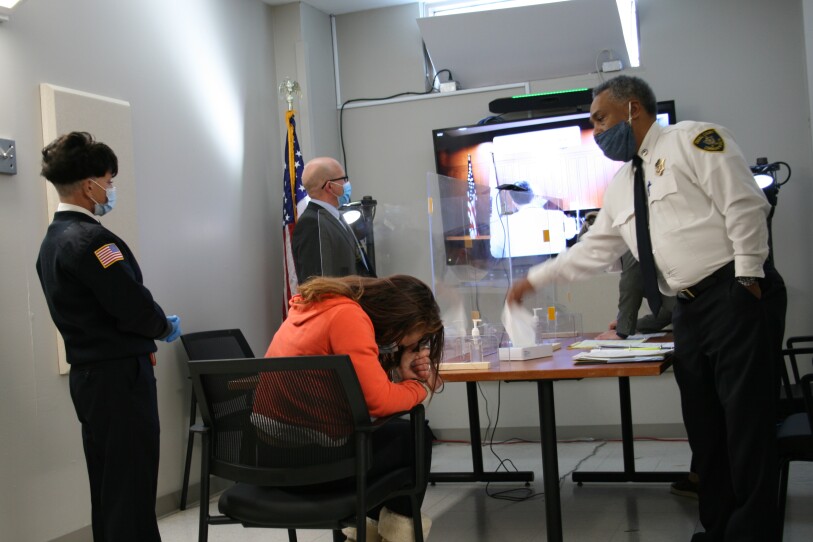The ACLU of Massachusetts has filed a class-action lawsuit seeking to bar the city of Boston from arresting unhoused people and removing their tents from encampments around Mass. Ave and Melnea Cass Blvd. without first identifying viable alternative housing options for the people living there.
“We’ve tried to arrest our way out of this, and it didn’t work,” ACLU executive director Carol Rose told GBH News, referencing the Walsh administration’s ‘Operation Clean Sweep’ of Mass. and Cass in 2019. “When you have a law enforcement response to a public health crisis, it's simply going to stay. That’s not theoretical — we experienced it.”
The lawsuit filed Thursday seeks monetary damages for the plaintiffs — three people experiencing homelessness identified as Ronald Geddes, AC and RAR — on the grounds that the city violated both their fourth and eighth amendment rights prohibiting unlawful seizures of property and cruel and unusual punishment.
“People are moving into their cars or under bridges or into other places, they’re losing their tents and their belongings, including their IDs and things like that, and they're being forced to go into other places far away from the services that they need,” Rose said. “They really aren't being offered appropriate shelter by the city, despite the assurances that they were going to do that.”
The complaint, filed in the Suffolk County Supreme Judicial Court, requests a restraining order to prevent the state and city from continuing to evict and arrest people in the area, and a preliminary injunction that allows occupants of the encampment to return to the area and live there, “unless and until Defendants identify alternative housing arrangements that take into account their individual needs.”
“The ACLU doesn't think that the appropriate remedy is necessarily that we should do nothing, but we can’t force the government to give people appropriate housing,” Rose said. “The remedy has to be that you cannot use the threat of taking away someone's liberty as a way to force them, to displace them from wherever they are unless they have a place to go.”
The lawsuit names defendants including the City of Boston, the Boston Police Dept., the Boston Public Health Commission and individuals acting as heads of those agencies, including acting Boston Mayor Kim Janey.

When asked about the lawsuit at a news conference Friday morning, Janey said she would not respond specifically to ongoing litigation, but she added “we will certainly comply with the courts and ... our approach has been a public health approach where we first provide notice.”
Janey said city outreach workers have referred more than 60 unsheltered individuals to in-patient treatment, city shelters, transitional housing, and assistance to return them to stable homes. Last month, Boston Health and Human Services Chief Marty Martinez said that around 350 people were living in the area, according to a city survey.
“We are working hard to identify beds, and we are not asking anyone to remove their property or to move off the streets without first identifying a place for them to go that is appropriate," Janey told reporters. "We are working hard to match the individual needs of the people who are living on the streets, living in tents, with the appropriate treatment and shelter options available.”
Janey noted that “we have just begun this work this week, it is ongoing outreach that happens every single day to connect individuals who need support to treatment and to services. We have made progress. There's more work to do, but we continue to use a public health approach.”

Janey issued an executive order last month, detailing plans to remove the encampments at Mass. and Cass and move people living there into shelter.
“With this executive order, residents facing substance use disorder and unsheltered homelessness can have the shelter and treatment they need to help them be safe and get better,” a statement from the city reads. Notices placed on tents over the past two weeks have given occupants a 48-hour window to remove their belongings, offering storage for 90 days and adding that “the city will dispose of all property remaining at the cleanup time.”
Janey’s order states that if a tent owner refuses to remove their belongings off the street, it “may be considered disorderly conduct and subject to enforcement of the existing laws of the Commonwealth of Massachusetts.”
The paper notices have only been written in English, “even though numerous people living in the area, like Plaintiff Mr. RAR, read limited English,” the ACLU complaint reads. Moreover, the ACLU alleges that the city has failed to meet its promise to provide a safe and stable alternative to tent encampments.
“When City officials arrived at the Mass & Cass area on October 28, Mr. Geddes was at the methadone clinic for his prescribed treatment. When he returned to his tent site, all his 15 possessions except a wet blanket, a few clothes, and a hockey stick had been seized and discarded in a City trash truck,” the complaint reads. “Without inquiring about his individual circumstances, Boston Public Health Commission employees told him that he could only go to Pine Street. Those BPHC employees did not confirm whether beds were in fact available at the Pine Street Inn men’s shelter, nor did they even ask whether there were any barriers, such as his PTSD, that would make such an option not viable for him.”
The complaint also points out that "the City has stated that it will arrest people with open warrants in the area. As a result of these pronouncements, people living in the area — who often do not know whether they have outstanding warrants, since many do not receive summonses or other written notice of court hearings precisely because of their homelessness — are living in fear of being seized at any time.”
The city convened what it called "Community Reponse Sessions" — makeshift court sessions in the Suffolk County jail — for people arrested on criminal warrants in the area.

As of Friday, roughly half the people brought into the court have been allowed to seek treatment in a medical setting, the others have been sent to jail. Defendant Corrine Davis was arrested Tuesday on a previous warrant for “attempt to commit a crime,” while standing in line to receive methadone treatment, and was brought into custody without her scheduled dose of treatment. Her attorney, Tim Brown, says Davis never received the summons to appear in court as it was sent to a previous address, and she does not have a home.
Maxwell Kolodka, who was brought in Monday for four outstanding criminal warrants including breaking and entering, operating under the influence and drug possession. Despite pleas from both his attorney and the prosecutor representing the Commonwealth, Kolodka was denied treatment for his active addiction and was sent to a jail with an ongoing COVID-19 outbreak.
The City of Boston has not responded to requests for comment on the court process, though Mayor-elect Michelle Wu told reporters Thursday that her office is seeking “more information” about the detention process for hearings being held at the Suffolk County jail, and rejected the idea of arresting people waiting in line for methadone as “unacceptable.”
Rose of the ACLU says that her organization will continue to monitor the court proceedings and examine possible civil rights violations within.
“The vast majority of people are actually just being displaced, not arrested, just being displaced under the threat of arrest, and that’s such an immediate thing,” Rose said. “So our immediate concern was to move quickly," to prevent people from "being displaced from what is in fact, their shelters." But she pointed out that it is possible additional claims wil be added to the lawsuit regarding the special court proceedings. "We need to see how it plays out first.”








